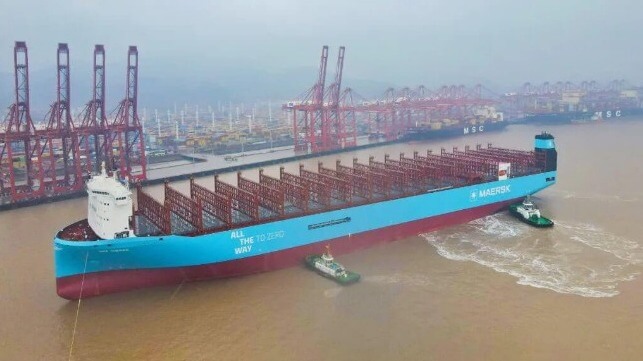Maersk Cautions of Overcapacity and Uncertainty for Container Shipping

Maersk presented a troubling outlook to investors speaking of expected headwinds and issues of oversupply challenges, eroding rates, and uncertainty while guiding to a forecast that could see profits down by as much as 90 percent and negative free cash flow in 2024. While the company achieved its 2023 guidance, Maersk’s outlook was below analysts’ forecasts, and with a pre-tax loss and weaker-than-expected performance from the logistics businesses, the price of Maersk’s stock tumbled.
“The current market remains one of robust volumes, but while the Red Sea crisis has caused immediate capacity constraints and a temporary increase in rates, eventually the oversupply in shipping capacity will lead to price pressure and impact our results,” Vincent Clerc, CEO of A.P. Moller–Maersk, told investors. “The ongoing disruptions and market volatility emphasize the need for supply chain resilience, further confirming that Maersk's path toward integrated logistics is the right choice for our customers to effectively manage these challenges.”
Maersk had previously mentioned the emerging issue of oversupply, but in interviews today with Bloomberg and others emphasized the significant impact they expected it will have on container shipping this year and likely into 2025. Clerc said on Bloomberg TV that the problem of overcapacity would last for a while highlighting that global container volume growth in 2024 will be in the range of 2.5 to 4.5 percent. However, he said global fleet capacity will grow at 12 to 13 percent this year.
The company warned investors that the oversupply challenges “will materialize fully over the course of 2024.” This came as Maersk placed the first of its 16,000 TEU methanol dual-fuel containerships, Ane Maersk, into service. The ship arrived in Ningbo, China on February 6 to start its maiden voyage and will be followed by 17 similar containerships in 2024 and 2025. Maersk has said it was focused on fleet replacement as part of its decarbonization efforts.
In addition, the company warned that the “duration and degree” of the Red Sea disruption and its impact on the industry remains unknown. They said it could run from one quarter to one year highlighting that security has not been re-established. Clerc said he believes that the threat was increasing as the Houthis are using a broader range of weapons. Maersk began diverting some ships in mid-December and increased the rerouting after one of its ships was targeted on December 31.
The company reported $9.8 billion in earnings (EBITDA) for the full year down from $36.8 billion in 2022. Revenues for the year were down by nearly half in the ocean shipping segment to $33.6 billion and revenues were also slightly under the 2022 full year for the logistics businesses. For the logistics businesses, Maersk cited destocking trends but also said it would increase the emphasis on cost management with analysts commenting that the business had come in below expectations.
The fourth quarter highlighted the extent of the challenges. While the company reported total revenues of $11.7 billion, with nearly $7.2 billion from ocean shipping, earnings were down dramatically. EBITDA was a profit of $839 million but on a pre-tax basis, Maersk reported a loss in the fourth quarter of $537 million (EBIT) with a more than $900 million loss (EBIT) from ocean shipping.
Citing the uncertainty for 2024, Maersk set a wide range in its 2024 projection forecasting earnings on an EBITDA basis of $1 to $6 billion (EBITDA) but on a pre-tax EBIT basis that equates to a loss for the year of as much as $500 million to at best breakeven. After generating strong free cash flows, they are forecasting negative free cash in 2024 of as much as $5 billion.

that matters most
Get the latest maritime news delivered to your inbox daily.
Management emphasizes its belief in the importance of the strategy focusing on logistics, including the announcement that they would divest the towage operations of Svitzer in a demerger to shareholders. Maersk maintained its dividend payout ratio, but emphasizing the need for strong cost control, announced it would suspend a long-term share buyback program. They said it would only be reviewed “once market conditions in Ocean have settled.”
The lower-than-expected projections and troubled outlook sent the price of Maersk shares down as much as 18 percent in trading. The stock recovered only slightly remaining down 15 percent on the day erasing a recovery from November 2023 lows for the stock after Maersk reported third quarter and said it was in the process of completing layoff for as many as 10,000 people.
